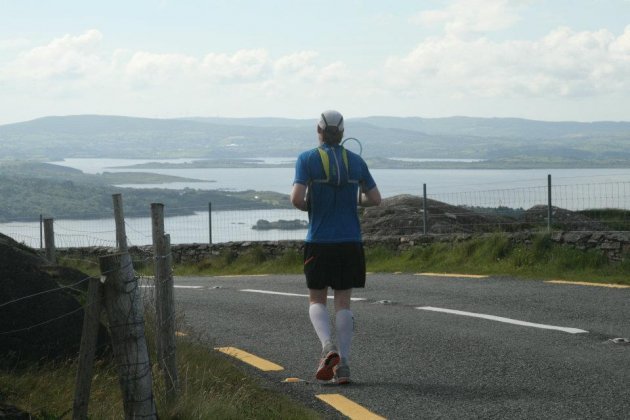Last weekend, 21-year-old Alan Corcoran became the first man to run a lap of Ireland – or the equivalent of 35 marathons in 35 days. Here he describes his gruelling experience.
ON MAY 27 I set off from Waterford City with the support of my family and friends to run a lap of Ireland, consisting of 35 marathons in 35 consecutive days.
This meant I was running 26.2 miles every day, or 184 miles each week for five gruelling weeks. Many people thought what I was attempting was impossible, since prior to last October my furthest run was one ten-mile run and my first ever marathon was the Dublin City Marathon on October 31 2011. On top of my inexperience of long distance running I was also in my fourth and final year of college, studying town planning.
Although I enjoy a physical and mental challenge, there was more to this 917 mile run than fulfilling a personal dream. In March 2011 my dad, Milo Corcoran, suffered from a stroke and was left unable to talk or get out of his hospital bed. Fortunately with the help of the National Rehabilitation Hospital he has since made a near to full recovery.
The three charities I decided to run for were the Irish Heart Foundation’s ‘Act FAST’ stroke awareness campaign, the National Rehabilitation Hospital and the Football Village of Hope, a peace building football charity my dad organises between Israeli and Palestinian children.
I had trained hard since October, mostly running on my own around Phoenix Park in all conditions before going to college each day or running into the early hours of the morning after my shift as a part-time kitchen porter. My seven month crash course in distance running meant that by the time the event had started I had clocked up seven marathons and two ultra marathons (31 miles and 39 miles), being accompanied by other runners on only two of these mammoth runs.
Alan during his run (Photo: Alan Corcoran)
As can be expected I suffered quite a few injuries and niggles while putting my body under such demands, but was lucky to have the help of my physios Roy Brennan and Siobhan Fitzpatrick to get me through the training.
The 35 days were an absolute rollercoaster, from the highs of running the first marathon pain-free with my friend Alex Flynn, to the lows of day 17 through Sligo where I grimaced, hobbled and cursed my way through nearly unbearable Achilles tendon pain to complete the 26.2 miles. Even though this was the hardest day, it was probably the day I’m most proud of as I had to really dig in to complete it.
Injuries were inevitable and I had my fair share, beginning with blisters, shortly followed by swollen feet, severe back pain, IT band syndrome, strained muscles, losing a toe nail and Achilles tendonitis. I’m asked repeatedly how I got through it and I put it down to a positive attitude and having a great support team. Any time I was hurting I just thought of how lucky I am to have the health and ability to even attempt something like this and I knew the further I got the more awareness and money would be raised for the charities.
It was an experience I wouldn’t change for the world – seeing the Irish coastline by foot, overcoming tough days, enjoying the good ones with my support team and getting to finish on the final day in the RSC, the track I trained on since I was ten, in the Waterford Viking Marathon with all my family and home crowd to cheer me over the line.
I’d like to thank my sponsors 53 Degrees North, my support crew and all the generous hotels and restaurants that helped out along the journey.
If people can spare a few euro for the three charities you can still donate on 35marathonman.ie.
Alan Corcoran is a 21-year-old from Waterford. To donate to his cause, visit his website. For more information on the charities, check out the Irish Heart Foundation, the National Rehabilitation Hospital and the Football Village of Hope.


